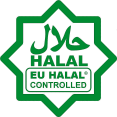Halāl (Arabic: حلال ḥalāl, 'permissible') or halaal is any object or an action which is permissible to use or engage in, according to Islamic law. The term covers and designates not only food and drink but also all matters of daily life. It is one of five الأحكام الخمسة (al-ahkam al-khamsah) — fard (compulsory), mustahabb (recommended), halal (allowed), makruh (disliked), haram (forbidden) — that define the morality of human action in Islam. Mubah is also used to mean "permissible" or "allowed" in Islam.
Generally in Islam, every object and action is considered permissible unless there is a prohibition of it in the Islamic scriptures. Clarification is given below in detail as to what is considered to be a permissible object or action in Islam, along with the exceptions.
Halal is often used in reference to foods and drinks, i.e. foods that are permissible for Muslims to eat or drink under Islamic Shariʻah (law). The criteria specifies both what foods are allowed, and how the food must be prepared. The foods addressed are mostly types of meat and animal tissue.
The most common example of non-halal (or haraam) food is pork (pig meat). While pork is the only meat that cannot be eaten by all Muslims at all (due to religious—as Quran forbids it—and hygienic concerns), foods other than pork can also be haraam. The criteria for non-pork items include their source, how the anumal was slaughtered, and how it was processed. It also depends on the Muslim's madhab.
The food must come from a supplier that uses halal practices. Specifically, there should be no stunning before the slaughter, the slaughter must be performed by a Muslim, who must precede the slaughter by invoking the name of Allah, most commonly by saying "Bismillah" ("In the name of God") and then three times "Allahu akbar" (God is the greatest). Then, the animal must be slaughtered with a sharp knife by cutting the throat, windpipe and the blood vessels in the neck, causing the animal's death without cutting the spinal cord. Lastly, the blood from the veins must be drained.
Muslims must also ensure that all foods (particularly processed foods), as well as non-food items like cosmetics and pharmaceuticals, are halal. Frequently, these products contain animal by-products or other ingredients that are not permissible for Muslims to eat or use on their bodies.
Foods that are not halal for Muslims to consume as per various Qurʼanic verses are:
- Pork
- Blood
- Intoxicants and alcoholic beverages
- Animals killed incorrectly and/or without Allah's name being pronounced before slaughter
- Animals slaughtered in the name of anyone but "Allah". All that has been dedicated or offered in sacrifice to an idolatrous altar or saint or a person considered to be "divine"
- Carrion (carcasses of dead animals, i.e. animals who died in the wild)
- An animal that has been strangled, beaten (to death), killed by a fall, gored (to death), savaged by a beast of prey (unless finished off by a human) or sacrificed on a stone altar.
Quranic verses regarding halal foods include: 2:173, 5:5, and 6:118-119, 121.
Source: Wikipedia



